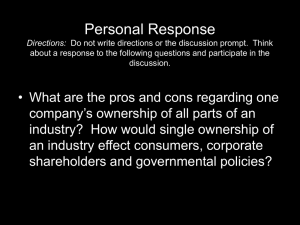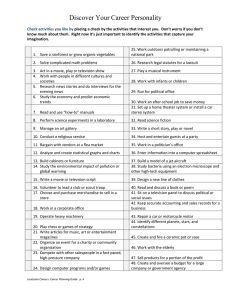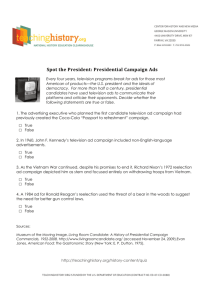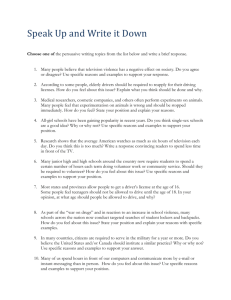The Media
advertisement
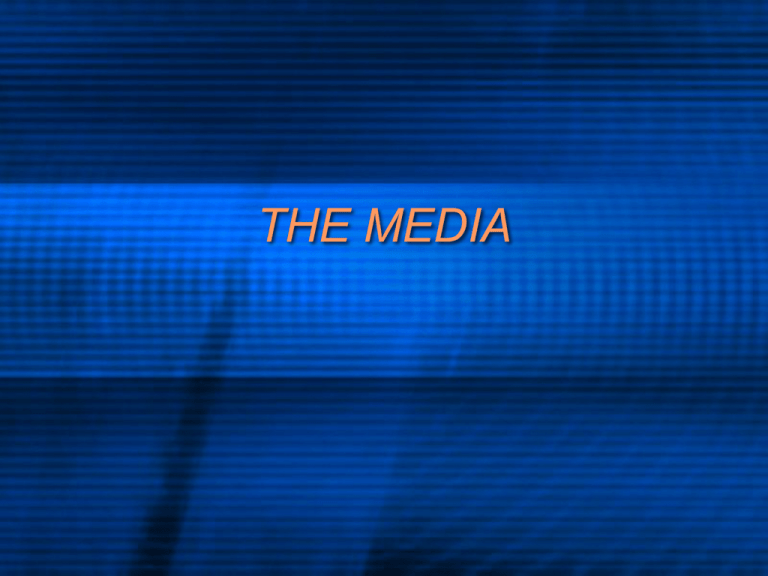
THE MEDIA WHO ARE THE MEDIA? Traditional Media Newspapers : NY Times, Wall St. Journal, Washington Post (Declining circulation) Television: CBS, NBC, ABC (Declining w/ cable t.v.)---Since ‘80 broadcast news has lost 54% of viewership; Nielsen report Magazines: Time, Newsweek, U.S. News and World Report (Declining circulation; down 10% in the last yr.) Trends toward mergers and consolidation (less competition; Viacom, Time-Warner, Disney, News Corp., G.E.) Who Are the Media? The “New Media” More interactive More emphasis on entertainment-”infotainment” Personalized Emotional Informal Opinionated Topical Ratings Cable News Aug. 2015 Nielsen program ratings for cable news channels for The Media and Public Opinion Does the media influence public opinion (Mixed Opinion) Yes: Television “personalizes” candidates and elections Media stress short-term elements of elections Those who consume media influence others Media help set national agenda Rise of advocacy journalism rather than objective journalism Journalists are more liberal as a whole Media are primary linking mechanism between public/gov’t Profit motive--emphasis on boosting ratings--”trivialization” of news----people less informed on important issues Other Examples REPORT: "Fair and balanced" Fox News aggressively promotes "tea party" protests (Source: mediamatters.org) On the February 27, 2009 edition of On the Record, host Greta Van Susteren said: " 'Tea party' protests are erupting across the country. Angry taxpayers, or at least some of them, are taking to the streets in the spirit of the Boston Tea Party. People are protesting President Obama's massive $787 billion stimulus bill, his $3.55 trillion budget and a federal government that has been ballooning by the day since the president took office." Not to be Outdone….. Media May Shape Opinion Based on Content Following the 9/11 terrorism, media coverage followed accusations by government authorities that pointed toward al Qaeda as the group that carried out the attack on the United States and Osama bin Laden as leader of that group. Those news reports on the attack and the aftermath shaped public opinion to support the war on terrorism. Do the media influence public opinion? No: Mass public pays little attention to the news and often forgets what it sees or reads Selective attention: many focus in on media sources they already agree with Selective perception: many perceive the news in a way they want to view it--they see what they want, filter out the rest Media are only one source of influence-- political socialization suggests importance of family, school, peers People consume media for variety of reasons other than information (boredom, entertainment---less likely to pay attention to hard news or analysis Impact of newspapers Typical perception of liberal bias, but they generally endorse Republican candidates (Publishers tend to be Republicans) Complaints from liberals and conservatives: Conservatives claim reporters are too liberal college graduates with hostility towards middle class values Liberals claim publishers are too conservative and are more concerned with profits than exposing social, economic , political evils Lack of Competition: most cities now have one major paper Largest amt. of pres. Campaign coverage devoted to day-to-day campaign activities “Horse Race” coverage (who is in the lead?) Impact of Television Most people get news from television (decline of substance; rise of image/slogans) Concern that television is aligned with “big government”: use of t.v. as throne of president President can bypass journalists questions Decline in presidential press conferences White House manipulation w/ photo ops and sound bites Concern that television has fostered cynicism, distrust, negativity towards politics Lack of competition (media conglomerates; TIME-Warner) Concern that people look at politics through “camera lens” rather than “party lens”; further decline of party Decline of network t.v. news in favor of cable t.v. news Effects of Media Roles of Media Gatekeeper: influence which subjects are of nat’l importance, ie to help set nat’l agenda Scorekeeper: keep track of, and help make political reputations Watchdog: scrutinize people, places, and events (Watergate, Iran-Contra) Nature of Media Influences Issue Framing “Sameness”; homogeneity of coverage Media companies are a business, main objective to make $ Most influential at the agenda-setting phase of policy making process Provide forum for building candidate image Act as linking mechanism between gov’t and people: In the past: People>Party>Government Now: People>Media>Government Contribute to higher cost of campaigning ($2 Bil. In 2012 election) Contribute to candidate-centered campaigns Nature (Cont’d) Increased role of campaign consultants (report on polls/focus groups) White House manipulation Photo Ops Sound Bites Spin Control Staged Events Negative coverage of Congress: Seen as obstructionist Far less coverage of Supreme Court Photo Ops and Staged Events Photo Ops and Staged Events Nature (Cont’d) Media most influential In primary elections rather than general On undecided voters. Most voters make up their mind before fall campaign. Increasing Importance of Internet Fundraising Communicating with the public: web sites, You Tube, Facebook. Twitter

